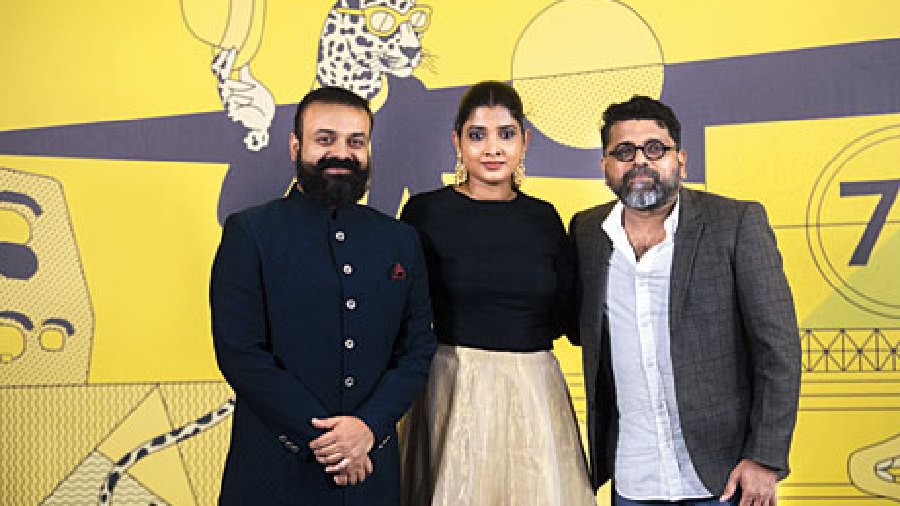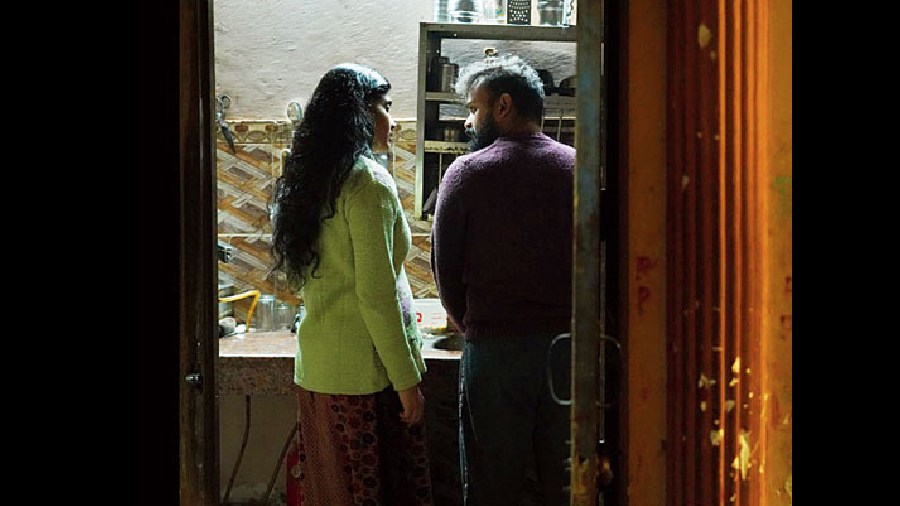Mahesh Narayanan, the man behind acclaimed Malayalam films like Take Off, Malik and CU Soon, now directs Ariyippu aka Declaration. Premiered in the Concorso internazionale (international competition section) of the 75th Locarno Film Festival, where it was nominated for the Golden Leopard, the film is set in the middle of the pandemic and stars Kunchako Boban and Divya Prabha as a middle-class Malayali couple working in the NCR region of the capital whose lives are torn asunder when a video clip goes viral.
With Ariyippu streaming on Netflix this Friday, t2 chatted with Mahesh, Kunchako and Divya on their intriguing film and what makes Malayalam cinema consistently stand out in today’s times.
Mahesh, what prompted the idea for Ariyippu and why set it in the NCR region?
Mahesh Narayanan: The whole idea started from an article I had read. All my films are based on incidents from my surroundings... some are from newspaper articles, some are from events that happened to my friends.... Most of these stories have a common connection, in the sense that they deal with the migrant population of Kerala.
The germ of Ariyippu came to me when I read a story about a lady asking for a declaration from the Bombay High Court. It was about a video featuring a lookalike of hers that was being circulated on various porn sites. She approached the court saying that the video was causing a lot of trouble in her personal and professional lives. She wanted a legal document stating that the person in the video wasn’t her.
I found this whole story very intriguing, as well as the fact that anything on the digital domain never really goes away, it will come back at some point of time. The lady in question, whose story this film is based on, is still working in a bank and she told the judge to give her that document and she would show it to anyone who would ‘stare’ at her.
This idea stayed with me for a long time and when the pandemic started, I got an opportunity to visit a lot of factories in Kerala. Just like in Noida, there is a Special Economic Zone (SEZ) in Cochin. They were the first people to gauge that there would be a virus outbreak because they had received a bulk order of latex gloves and masks. They told me, ‘Something is going to happen, something is going to happen’.
I met a few people there who were trying to migrate to Asian countries like Malaysia, Singapore and Indonesia where there is a lot of latex production. Their transit route was either through Delhi, Chennai or Hyderabad. The Delhi route is important because the embassies are there and the counselling groups for emigration function mostly out of Delhi. That’s why I decided to place this film in the NCR region.

Director Mahesh Narayanan (right) with Kunchako and Divya at the premiere of the film at the Locarno Film Festival
Mahesh, in an interview post the film’s premiere at the Locarno Film Festival, you said that you cast Kunchako Boban and Divya Prabha in the lead roles because of their relatability factor. What is it about them as actors and as people that made you pick them? Kunchako and Divya, the situation may not be relatable but did the emotions that your characters go through strike a chord?
Mahesh: I don’t think of any faces until I have a first draft in hand. It’s then that I pick my actors...
Not even Fahadh Faasil’s face since he’s made it to every film of yours, except Ariyippu?
Mahesh: No, no, no, no! (Laughs) It’s not that. Kunchako Boban has also been a part of all my films. It’s just that working with friends makes things easy. They understand me very well, they know how sensitive I am and also how difficult it is to work with me (laughs). When I come up with a story, or at least a decent one line, I start pitching it to actors.
In the case of Ariyippu, Kunchako is a close aide and I pitched it to him saying that he hasn’t played a character like this before. Even in my case, I never stick to one genre... all my films are different.If I had to place a skilled labourer from Kerala in a factory in Delhi, I had to make sure that the audience feels that this person can be a part of this environment. Divya has been a part of my films Take Off and Malik, but she played secondary characters in those films. I thought she was perfect to play the lead in this film.
Divya Prabha: I took this opportunity to explore myself as an actor. This is my third film with Mahesh and that helped me a lot in understanding what he expects from his actors. When I heard the script, I was really moved, I felt very strongly for the character that I play.
Kunchako Boban: Mahesh and I have known each other for a long time and his association with me has been from my second innings... I took a hiatus in between. It’s my 25th year in the industry and I had been tagged as a romantic hero for a long time. Mahesh is a director who has pushed me to try out different types of movies and characters. Some daring characters, which I never dreamt I could pull off. We started off with Gulumaal, which was a fun film and then Traffic happened, which changed the direction of the Malayalam film industry as a whole.
With Ariyippu, we wanted to make a film which is deeply rooted in the Indian culture and yet we could place it at the global level. Ariyippu is the best script Mahesh has written till now.
The circumstances that my character Harish finds himself in and his emotions are alien to me personally. But the emotions that I felt while reading the script... that was the main factor. The script left me in awe because this story has very intense layers. I called up Mahesh and said, ‘Damn, man! What have you written?! Can I pull it off?!’ (Laughs) He told me that we have to do it because this is a film which is so true. And that’s what we stuck to... there was no adulteration, right from the scripting to the shooting level. We shot almost chronologically and in real locations... the glove factory was real, Harish and Reshmi’s home was real. Even though the scenes were dramatic, Mahesh was quite clear that we should not allow any drama into our acting. Everything had to be real. Sanu Varghese’s camerawork only accentuated that.
It’s interesting that you spoke about keeping things real because that’s been the trademark of Malayalam cinema. Some of the best stories, rooted in the here and now, are coming out of the Malayalam industry. Even when you make a superhero film like Minnal Murali, its ethos is very real, unlike an RRR or Bahubali, which is larger-than-life cinema. What, for you, defines Malayalam cinema now?
Mahesh: Malayalam cinema has always been in a mid-stream kind of category. If you look for a Bombay comparison, then I will say that Hrishikesh Mukherjee was a mid-stream film-maker. Malayalam film-makers, right through the decades, have been enthusiastic about providing meaty and meaningful cinema. Somehow that changed in the ’90s and then the shift again happened in the early 2000s. A film like Traffic happened in 2009, and all of a sudden, the form and narrative became challenging to the audience and we started shedding the larger-than-life aspects and rooted the stories to our nativity.
Even the megastars of Malayalam cinema started seeking real content. And when the streaming platforms came in, they started supporting the same. Now the kind of films we make, a person sitting in Calcutta is bound to feel the same emotions as someone in Cochin.
With Ariyippu, I didn’t want to make it just a Malayalam film. We have used multiple languages … 50 per cent of the film is actually in Hindi. This defines the spirit of Malayalam cinema now... cinema that speaks multiple languages, literally and otherwise.










